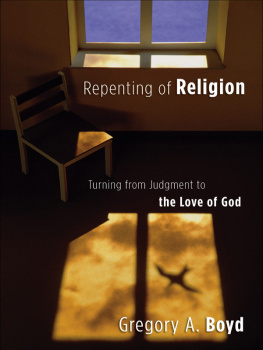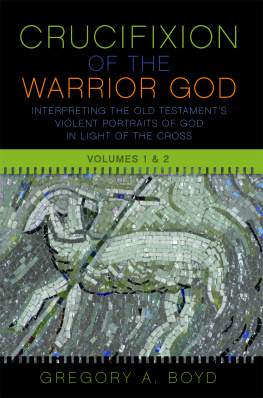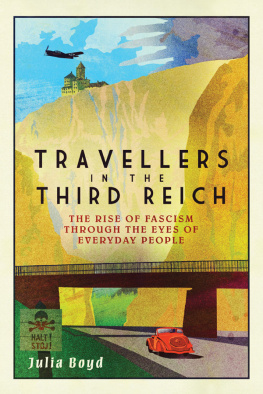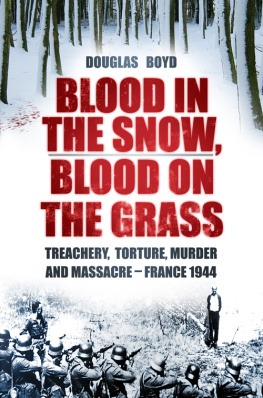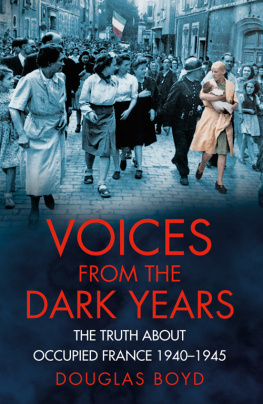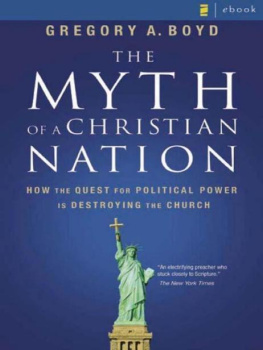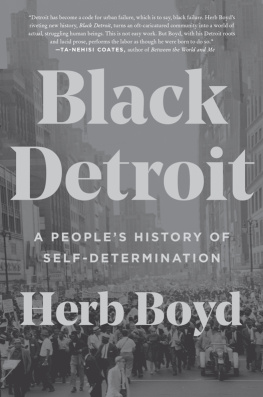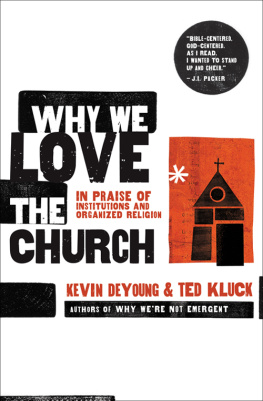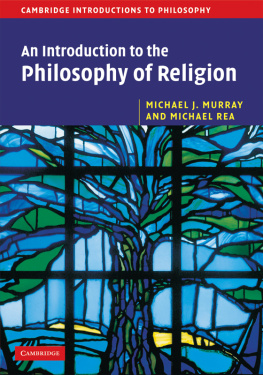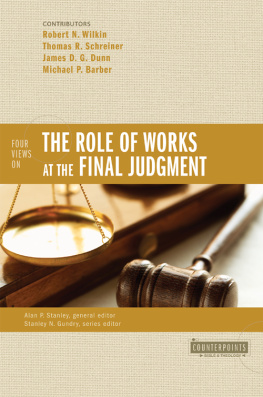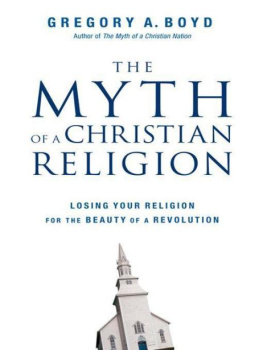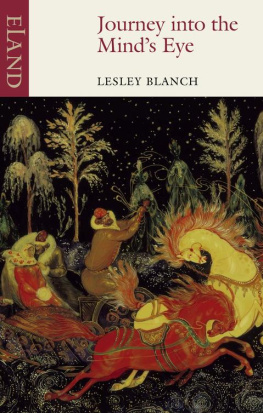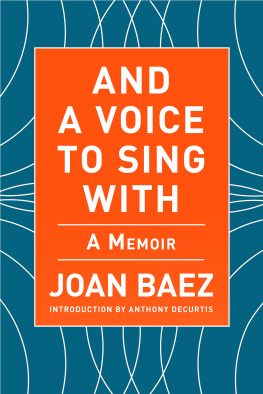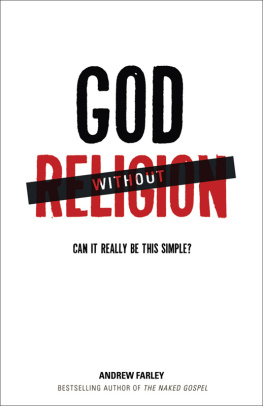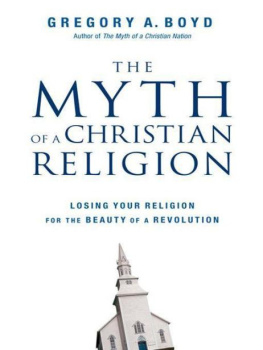Repenting of Religion
Turning from Judgment to the Love of God
Gregory A. Boyd

2004 by Gregory A. Boyd
Published by Baker Books
a division of Baker Publishing Group
P.O. Box 6287, Grand Rapids, MI 49516-6287
www.bakerbooks.com
E-book edition created 2012
Ebook corrections 3.21.2012
All rights reserved. No part of this publication may be reproduced, stored in a retrieval system, or transmitted in any form or by any meansfor example, electronic, photocopy, recordingwithout the prior written permission of the publisher. The only exception is brief quotations in printed reviews.
ISBN 978-1-5855-8948-7
Library of Congress Cataloging-in-Publication Data is on file at the Library of Congress, Washington, DC.
Unless otherwise indicated, Scripture is taken from the New Revised Standard Version of the Bible, copyright 1989, Division of Christian Education of the National Council of the Churches of Christ in the United States of America. Used by permission. All rights reserved.
Scripture marked KJV is taken from the King James Version of the Bible.
Scripture marked NIV is taken from the Holy Bible, New International Version. NIV. Copyright 1973, 1978, 1984 by Biblica, Inc. Used by permission of Zondervan. All rights reserved worldwide. www.zondervan.com
To Gina and Richard Patton
You rekindled my love for Bonhoeffer
and helped me see the profound antithesis
between love and judgment.
Jesus calls men,
not to a new religion,
but to life. DIETRICH BONHOEFFER
Contents
Very rarely is a connection made between love on the one hand and judgment on the other. In this work I argue that they are as inseparably connected as up and down and good and evil. We love only insofar as we abstain from judgment.
Love is the central command in Scripture and judgment the central prohibition. Indeed, judgment is the original sin in Scripture. This is why the forbidden tree in the center of the gardenthe prohibition around which life in the garden revolvedwas called the Tree of the Knowledge of Good and Evil.
In my opinion no topic could be more foundational or more important than this one. It addresses the central purpose for which God created humans (to share in his perfect love) and the central obstacle to fulfilling that purpose (our judgment). Yet the connection between these two rarely has been explored. Partly because of this the body of Christ does not consistently love as Christ loves. Indeed, large segments of the body of Christ mistake their judgmenttheir eating from the Tree of the Knowledge of Good and Evilto be love! Tragically, they promote the essence of the fall as though it were salvation.
The primary focus of this work is practical. Several thinkers, the most notable being Dietrich Bonhoeffer, have discussed the all-important antithetical relationship between love and the knowledge of good and evil. But the insight has not to date been discussed on a laypersons level with the goal of helping people apply it to their lives. My earnest hope and prayer is that the Spirit of God will use this work to help us acquire a vision for the church as a nonreligious community of outrageous love. I pray that God will use this work to help us free ourselves from our addiction to judgment, experience the unsurpassable love of God, and reflect this Calvary-like love toward all people.
As the numerous quotes and endnotes throughout this work will make clear, my thesis has been greatly inspired by my reading of Bonhoeffer. Indeed, this work can be understood as a consistent interaction with his thought. Bonhoeffers reflections on love and judgment are highly nuanced, profound, but also difficult for nonacademics to grasp. In this work I try to make the core of his insight accessible to lay readers and academics alike. Toward this end, I have placed much of the more difficult Bonhoeffer material in the endnotes. Lay readers not inclined to wrestle with this material may bypass it and lose nothing of the substance of this work.
At the same time, it needs to be made clear at the start that this work is not intended to be a popularization of Bonhoeffers theology. Much of what I have to say was never addressed by Bonhoeffer. Much of what Bonhoeffer has to say, even fascinating aspects of his reflections on the knowledge of good and evil, I do not address. Some of what I have to say takes his thought in new directions that Im sure he did not anticipate and that may not have met with his approval. And despite the profound respect I have for this hero of the faith, some of what I have to say flatly disagrees with what he said. Acknowledging all of this up front hopefully will prevent students of Bonhoeffer from being disappointed and others who have no interest in Bonhoeffer from being put off.
I am indebted to many aside from Dietrich Bonhoeffer for helping bring this work into being. My thanks to Ed Silvoso, who preached a sermon in 1996 at Woodland Hills Church that first opened my eyes to the antithetical connection between love and judgment. I also must express deep appreciation to Woodland Hills Church in Maplewood, Minnesota, for its loyalty in hearing and living out the innumerable messages on Love and Judgment that I have given over the last few years. Most of the ideas articulated in this work were first preached to this vibrant congregation, sometimes numerous times. Thanks for your patience!
My covenant brother Dr. Paul Eddy has offered, as usual, outstanding feedback on early drafts of this work. My dear friends Tyler and Chelsea DeArmond selflessly have given much time to reviewing this work, as they did with several previous works of mine. Most of what I have learned about sharing life in community I have learned from my small group of ten years, Greg and Marsha Erickson, Dave and Terri Churchill, and Julie and Alex Ross. I had no idea how profound and beneficial intimate fellowship could be prior to my relationship with these wonderful friends and colleagues in the battle.
As is the case with all my writings and indeed my entire ministry, this work would not have been possible without the constant love and support of my precious wife, Shelley, as well as my three delightful children, Denay, Alisha, and Nathan. Finally, while I had read Bonhoeffer in years past, the profundity of his reflections on the nature of the knowledge of good and evil largely escaped me until I met Gina and Richard Patton. They not only reintroduced me to Bonhoeffer but also inspired many of the reflections I offer in this book. The book as a whole has benefited greatly from the many dialogues and debates we have enjoyed on this and related issues over the last several years. It is thus with profound gratitude that I dedicate this work to them.
And the LORD God commanded the man, You may freely eat of every tree of the garden; but of the Tree of the Knowledge of Good and Evil you shall not eat, for in the day that you eat of it you shall die.
Genesis 2:16
The knowledge of good and evil seems to be the aim of all ethical reflection. The first task of Christian ethics is to invalidate this knowledge.
Dietrich Bonhoeffer
An Experience of Love
I am sitting in a mall on a Saturday afternoon. As I sip my Coke and relax, I study people. I notice some are pretty and some are not. Some are slender; some are obese. On the basis of what they wear, their facial expressions, the way they relate to their spouses, friends, or kids, I conclude some are godly while others are ungodly. Some give me a warm feeling as I watch their tenderness toward their children. Others make me angry or disgusted.
Then suddenly I notice Im noticing all this . Believing as I do that every activity we engage in, including our thinking, is for a purpose, I begin to wonder what purpose this silent commentary about other people is serving. After a moments introspection I realize it is on some level making me feel good. It is in a sense feeding me. Its satisfying some need I have to stand in judgment over people. Deep down, I enjoy being the one who at least before the tribunal of my own mind gets to pronounce the verdict: Pretty. Ugly. Good figure. Fat. Godly. Ungodly. Disgusting. Cute. And so on.
Next page
